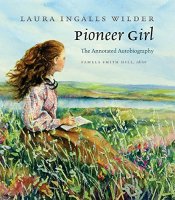 Pioneer Girl: The Annotated Autobiography by Laura Ingalls Wilder, edited by Pamela Smith Hill (South Dakota Historical Society Press, 2014)
Pioneer Girl: The Annotated Autobiography by Laura Ingalls Wilder, edited by Pamela Smith Hill (South Dakota Historical Society Press, 2014)
As a young child I fell in love with Laura Ingalls Wilder's Little House in the Big Woods, and naturally ate up the rest of the series when I discovered it. The earlier books (particularly Little House in the Big Woods and Farmer Boy) remain my favorites, and having now read Pioneer Girl I better know why. The first few books in the series are full of the delight of a child and a child's-eye view that paints pioneer days with glory: the joy of good work, good food, open spaces, hope, family togetherness, and lots of "Inch by Inch" hippie naiveté. As the story goes on, however, the children grow older, and adult worries and realities intrude. Plus, I've never gotten over my childhood dislike of of romance stories, and if anything, coming-of-age stories are even worse. I identify a lot with Peter Pan.
Pioneer Girl was Wilder's original, unpublished memoir, from which grew the Little House series, as well as many of daughter Rose Wilder Lane's writings. It is full of the adult realities behind all the books. As such, it is informative, even fascinating—but also a sharp reminder that it takes more than a rake, a hoe, and a piece of fertile ground to make a garden, or a life. Don't get me wrong; this is no exposé, revealing the deep, dark secrets behind the children's books. It's just that it made me realize that I'd rather keep my genealogy real and my children's stories warm-and-fuzzy.
There is a lot of genealogy in Pioneer Girl, as Hill has painstakingly identified the people that Wilder wrote of, even in passing. Reading it reminds me of my work for Phoebe's Quilt, only a lot more extensive. "Extensive" is the word for Hill's annotations. Genealogy, comparing versions of the materials, analyzing writing style, researching historical realities, and explaining cultural references in minute detail; whatever it is, Hill's work is extensive. Some of that I appreciated, and some I did not. Although the book is clearly written for adults, Hill seems to assume that her readers are no more knowledgeable than the children who were the intended audience for the Little House series. She explains common cultural knowledge in excruciating detail; had she been analyzing my first paragraph above, she would have provided publisher information for the books, provided the lyrics for the song, explained about hippies, defined the romance and coming-of-age genres, and told the story of Peter Pan, including its author, date of publication, and cultural significance. I have to admit I prefer not to be considered completely ignorant, even if it means I have to look some things up.
Serious Little House devotees will find it worthwhile to read Pioneer Girl. I found it encouraging to learn that while the books are deliberately fiction, and have taken liberties with some of the facts, most notably by leaving out significant events and rearranging the order of others, Little House is no mere "inspired by" work that bears little to no resemblance to the facts. The stories ring true because they mostly are true. But people's lives simply don't unfold the way a good story does, and Laura Ingalls Wilder chose to craft her tales of American pioneer life with all the skill of a novelist.


